 Libri di David Wragg su Unilibro.it) Libri di David Wragg su Unilibro.it)
|
|
1919 |
 Title :
Black Hawks
Title :
Black HawksAuthor: David Wragg Publisher: HARPER COLLINS PAPERBACKS € 11,70
|
|
|
1918 |
 Title :
Operation Sealion
Title :
Operation SealionAuthor: Wragg David Publisher: Pen & Sword € 35,70
|
|
|
1917 |
 Title :
Southern Railway Handbook
Title :
Southern Railway HandbookAuthor: David Wragg Publisher: History Press € 23,70
|
 Title :
LNER Handbook
Title :
LNER HandbookAuthor: David Wragg Publisher: History Press € 24,10
|
|
1916 |
 Title :
Total Germany
Title :
Total GermanyAuthor: Wragg David Publisher: Skyhorse Pub Co Inc € 22,30
|
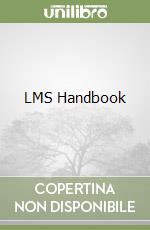 Title :
LMS Handbook
Title :
LMS HandbookAuthor: David Wragg Publisher: History Press € 23,70
|
|
1913 |
 Title :
The Southern Railway Story
Title :
The Southern Railway StoryAuthor: Wragg David Publisher: History Pr Ltd € 17,20
|
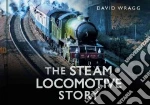 Title :
The Steam Locomotive Story
Title :
The Steam Locomotive StoryAuthor: Wragg David Publisher: History Pr Ltd The fascinating story of the British steam locomotive Britain was the birthplace of the steam locomotive and even today, the world speed record for steam remains with a British locomotive, Mallard. The steam locomotive went through several distinct phases during its long life, which came to an end on regular service in the late 1960s. There was the early phase, then the trend for large single driving wheels, compound locomotives with connected driving wheels once steel became strong enough for the connecting rods, tanks engines that could run equally well forwards and backwards, the 4-6-0 and 4-6-2 expresses, the passion for speed records and streamlining, and then the standardization years of British Railways. Steam locomotives were even incorporated into railcars to improve the economics of branch lines. So significant was the steam locomotive that it gave its name to an era, the Steam Age. € 11,90
|
|
1912 |
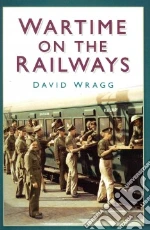 Title :
Wartime on the Railways
Title :
Wartime on the RailwaysAuthor: David Wragg Publisher: History Press From the American Civil War onwards, railways have been an important aspect of war. So important were the railways that in the First World War, the state took control of the railways, and then repeated this exercise in the Second World War. Wartime on the Railways describes the part played by Britain's railways during the Second World War, dealing not simply with operational matters or the impact of enemy action on the railways, but also looking at financial arrangements, the part played by railway workshops in producing equipment for the military, the wartime experience of the railways' ships, with the narrative augmented by personal accounts from railwaymen, and women as the war years saw much change. The book includes chapters on the railways during the final years of peace, and on each of the "Big Four" companies, London Transport's underground system, the impact of wartime restrictions on travel and scheduling, the role of the railway workshops, and ports and shipping, as many railway ships were lost during the battle for France and at Dunkirk. € 22,30
|
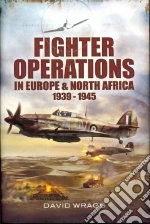 Title :
Fighter Operations in Europe & North Africa 1939-1945
Title :
Fighter Operations in Europe & North Africa 1939-1945Author: Wragg David Publisher: Pen & Sword € 35,70
|
|
1911 |
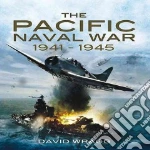 Title :
Pacific Naval War 1941-1945
Title :
Pacific Naval War 1941-1945Author: David Wragg Publisher: PEN & SWORD BOOKS € 35,70
|
|
|
1910 |
 Title :
The World's Top 500 Airports
Title :
The World's Top 500 AirportsAuthor: Wragg David Publisher: Motorbooks Intl Equally loved and loathed by the public and the media, airports are crucial to the operation of passenger and airfreight services worldwide. The World's Top 500 Airports is the leading guide on the subject. It contains a brief history of each airport, details of runways and terminals, annual passenger numbers and aircraft movements. For the 'Top 250' airports there is a map, details of the main user airlines, and details of whether traffic is scheduled, chartered, passenger or freight. Freight traffic figures and ranking for freight are also given. Data and world rankings are supplied by the US-based Airports Council International. € 42,80
|
|
|
2009 |
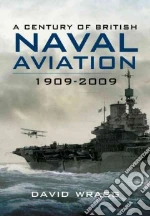 Title :
A Century of British Naval Aviation 1909 - 2009
Title :
A Century of British Naval Aviation 1909 - 2009Author: Wragg David Publisher: Pen & Sword Wragg, a maritime historian, consultant, and author, relates the history of the first century of British naval aviation from 1909 to 2009. He describes the technological achievements of the Royal Navy, such as angled flight decks, mirror deck landing systems, and vertical take-off and landing; operational successes during the two World Wars, including the sinking of the German light cruiser Konigsberg, the attack on the Italian fleet at Taranto, and Arctic and Atlantic convoy protection and operations with the US Navy in the Pacific; and post-war events like the Suez Campaign of 1956 and the recapture of the Falklands after the Argentine invasion, as well as operations in the Gulf. Distributed by Casemate. Annotation ©2010 Book News, Inc., Portland, OR (booknews.com) € 35,70
|
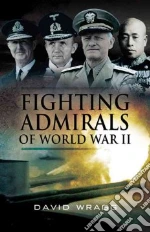 Title :
Fighting Admirals of the Second World War
Title :
Fighting Admirals of the Second World WarAuthor: Wragg David Publisher: Naval Inst Pr Wragg, formerly the Head of Communications with the Royal Bank of Scotland and now a noted author and journalist, has written this collection of biographies on the naval commanders who influenced the outcome of World War II. Written for naval enthusiasts and historians, this book offers detailed portrayals of admirals from both sides of the conflict and analyzes the challenges and triumphs each officer faced. The author also explores naval developments in both the Atlantic and the Pacific and provides detailed analyses of the military prowess of each Navy. Annotation ©2009 Book News, Inc., Portland, OR (booknews.com) € 29,40
|
|
2007 |
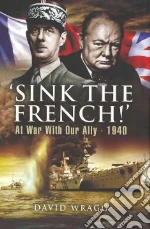 Title :
Sink The French
Title :
Sink The FrenchAuthor: Wragg David Publisher: Pen & Sword € 37,00
|
|
|
2006 |
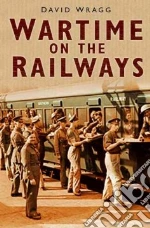 Title :
Wartime on the Railways
Title :
Wartime on the RailwaysAuthor: David Wragg Publisher: Sutton Publishing Ltd From the American Civil War onwards, railways have been an important aspect of war. While the first interest by the military in railways in Britain was intended primarily for internal security, the Boer War saw massive movement of men and their horses over the London and South Western Railway and through its port at Southampton. So important were the railways that in the First World War, the state took control of the railways, and then repeated this exercise under somewhat more controversial arrangements in the Second World War. "Wartime on the Railways" is an account of the part played by Britain's railways during the Second World War, dealing not simply with operational matters or the impact of enemy action on the railways, but also looking at financial arrangements, the part played by railway workshops in producing equipment for the military, the wartime experience of the railways' ships, with the narrative augmented by personal accounts from railwaymen, and women as the war years saw many jobs traditionally handled by men taken over by them. The book will include chapters outlining the preparations made by the railways for wartime during the final years of the peace, and will have chapters for each of the 'Big Four' companies, for London Transport's underground system, and also on financial arrangements, the impact of wartime restrictions on travel and scheduling, the role of the railway workshops, and of the ports and shipping, as many railway ships were lost during the battle for France and at Dunkirk. € 26,30
|
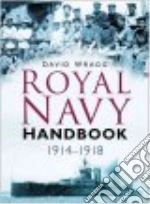 Title :
Royal Navy Handbook 1914-1918
Title :
Royal Navy Handbook 1914-1918Author: David Wragg Publisher: Sutton Publishing Ltd Telling the story of how the Royal Navy, the largest in the world in 1914, adapted to the demands of war, this book chronicles the leaders and the events from 1914 to 1918. It describes how many ships that could no longer fight were thrown out, created the world's most modern battleship, and recognized the importance of submarines and aviation. From how the initiative allowed to warship commanders had been lost in a service more concerned with fleet maneuvers and evolutions to the climactic Battle of Jutland, the largest naval battle of World War I, this history also documents how the Royal Navy was given responsibility for the air defense of the United Kingdom. € 30,20
|
|
2001 |
 Title :
Da Pearl Harbor alla guerra del Golfo. I fiaschi militari del XX secolo. Le grandi vittorie mancate e i pił clamorosi errori tattici della storia contemporanea
Title :
Da Pearl Harbor alla guerra del Golfo. I fiaschi militari del XX secolo. Le grandi vittorie mancate e i pił clamorosi errori tattici della storia contemporaneaAuthor: Wragg David Publisher: Newton & Compton Il 27 maggio del 1905 ebbe inizio la prima delle grandi battaglie navali del Novecento, quella di Tsushima, nella quale la flotta russa e quella giapponese si affrontarono per decidere le sorti del conflitto per la supremazia sulla politica asiatica. I giapponesi avevano solo quattro corazzate, veterane della battaglia del Mar Giallo, e otto incrociatori; ma le errate scelte tattiche della marina zarista permisero loro di conseguire la vittoria e il predominio, per un lungo periodo, sui mari asiatici. Nel corso del XX secolo errori militari o politici hanno spesso portato al disastro campagne od operazioni belliche che sembravano destinate al successo. In questo volume Wragg esamina le grandi vittorie mancate per incompetenza militare o errori politici. € 13,89
|